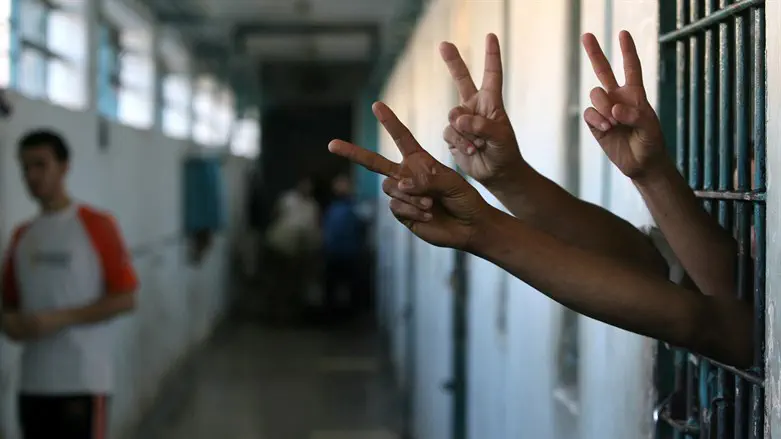
The Palestinian Authority’s (PA) prisoners' administration on Thursday announced an agreement with the Israel Prison Service, which resulted in a planned hunger strike by imprisoned terrorists, which was planned for the month of Ramadan, being cancelled.
The administration said in a statement that the prisoners' leadership "preserved their rights" after "intense negotiations". No official in Israel has confirmed the agreement.
A Palestinian Arab source claimed that the terrorists received a promise that their imprisonment conditions would not be harmed and that prisoners’ showering time in the Nafha prison would be extended to 20 minutes, after National Security Minister Itamar Ben Gvir ordered to allocate a showering time of only about four minutes for each terrorist prisoner, and to provide a total time of one hour of running water to each prison wing in which terrorists are held.
The director of the Palestinian Prisoners Club, Qadura Fares, told the Arabic-language Ashams Radio that the ambiguity surrounding the understandings reached by the parties is intentional, "because neither side wants to provoke the other side."
Fares added that, from now on, any change in the conditions of the terrorist prisoners will be discussed in the Security Political Cabinet “and it will not be decided based on Ben Gvir's personal whims."
Senior members of the Israel Security Agency (Shin Bet) and the National Security Council were involved, including the head of the NSC Tzachi Hanegbi, assisted by representatives of the Israel Prison Service. As noted, Ben Gvir was not involved in the talks, and will not decide on his own in the future about worsening the terrorists' prison conditions.
These details, however, contradict the announcement made by the Minister of National Security, who stated that no agreement has been made with the terrorists and that his policy is being implemented.
"I trust Major-General Katy Perry, head of the Israel Prison Service, and the command staff who made it clear to me last night that no agreement was made with the terrorists in the prisons and that my policy is being implemented," wrote Ben Gvir in a statement to the media.
Ben Gvir continued, "The 'price of the loss' that the Israel Prison Service clarified to Hamas is the message I asked to convey to all prison commanders, that if there is a hunger strike, we will discuss the implementation of the conclusions of a committee which called to deny the terrorists all their rights, starting already this Ramadan. I assume that Hamas understood the message and apart from individual prisoners there is no hunger strike in the prisons."
A Hamas spokesman, meanwhile, welcomed the cancellation of the prisoners' hunger strike and said, "Israel's agreement to the prisoners' demands before they went on strike represents a new victory and emphasizes their ability to meet challenges. This is a message from our people - we are capable of winning any campaign we wage."
Jailed terrorists have more than once used the method of hunger strikes in order to pressure Israel to release them or improve the conditions of their imprisonment.
Israel has several times in the past caved to the pressure and released some hunger strikers.
At times, the terrorists were found to be secretly eating during the hunger strike. A prominent example of this was in 2017, when the Israel Police released footage of archterrorist Marwan Barghouti, who was caught eating in secret while maintaining the pretenses of his own hunger strike.
